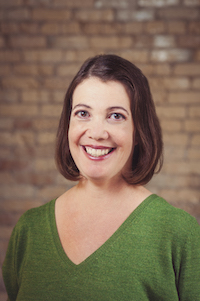Above: Dr. Amelia Bueche will be a lead presenter at the March 14, 2019, Culinary Medicine Workshop in Traverse City. Co-hosted by Groundwork, Table Health and Munson Healthcare.
Let food be thy medicine. The idea has been around for hundreds of years, but over time it became hijacked by people who took the notion to extremes. People developed fad diets. People fixated on carbohydrates. People took principles like nutrition and turned them into nutritional supplements and pills and powder-mixed drinks.
As the idea of eating well to stay healthy moved along those various arcs, important aspects of food were lost—the experience of slicing, chopping, and working with whole foods, the experience of sharing a meal with family and friends, the experience of filling a kitchen with the scent of cooking food, and the legitimate and complete nutritional profile of fresh, local food. And all of these aspects of food—the emotional ones, the sensory ones, the social ones, and of course the nutritional ones—matter for our well-being.
Some physicians see the need to bring back that more complete view of “let food be thy medicine,” and advocates call that approach “culinary medicine.” Groundwork, the Great Lakes Culinary Institute, and Munson Healthcare held the region’s first culinary medicine conference in 2017, building on two previous Farms, Food and Health conferences held in 2014 and 2016, which promoted the concept of connecting local food to healthcare and wellness in our region.
Groundwork and partners are now announcing they will team up to present a one-day culinary medicine workshop on March 14, and a three-day culinary medicine conference in September.
Dr. Amelia Bueche (pro: bee-kee), of the medical practice Table Health, has made culinary medicine a central part of the care she provides, and she and her practice will play a lead role presenting at and hosting the March workshop. As Bueche explains it, in culinary medicine, physicians work with patients to bring healthy foods into their lives and tailor their eating to individual health needs. Equally important, physicians give patients the cooking skills and lifestyle strategies that are essential for making that transition a success.
One innovative and powerful aspect of culinary medicine is physicians who preach it also practice it. “In learning how to practice culinary medicine, you have to adapt how you as a physician are eating and cooking and behaving at home, so you are providing yourself self-care as well,” Bueche says.
The awareness gained at home allows the physician to be more effective in conveying those skills to the patient. “You have a better understanding of what the patient is going through. It takes X amount of work to chop those vegetables and get everything ready versus going to a drive-through,” she says. Being able to share personal experience builds the patient relationship on multiple levels, as well. “It can be synergistic. Like, I’m learning this. I’m living it. So I can recommend it more wholeheartedly and more effectively and give a testimonial. ‘I know it’s hard because when I stopped using processed foods my family freaked out at first, but here’s how we learned to make it work.”
When practiced fully, culinary medicine extends the relationship value deeper into the community. “We should be recommending sources for good food, so that might mean recommendations for local farmers or restaurants where we know they grow and/or source high-quality food,” Bueche says.
Bueche uses herself as an example of how culinary medicine principles can be effective. During her third pregnancy, as she once again faced gestational diabetes, she hoped to avoid insulin during pregnancy and reduce her risks of developing diabetes later in life. So she looked closely at her diet, sharply restricted her carbohydrate intake, ultimately adopted a vegetable-heavy paleo diet, and incorporated high-quality pastured animal products. Her blood sugar levels returned to normal.
Her example makes two important points. One, there is power in this approach. And two, the food path patients take is specific to them. “What works for me won’t necessarily work for you, but we can use knowledge, experience and feedback to guide a better path,” she says. Learning what foods are best for you takes time and energy, an investment worth making that will pay dividends in health long term.
On March 14, 2019, Groundwork will partner with Amelia and her colleagues at Table Health to offer a half-day training building on the culinary medicine concept. As with 2017’s Culinary Medicine conference, the program will likely offer continuing medical education credit through Munson Healthcare, and involve small-group instruction—about 30 people—in the Table Health practice, which has a large kitchen/instruction space. Dr. Bueche will be a lead instructor with support from local chefs, culinary instructors and dietitians. Come evening, workshop participants will join the community for a larger, public event at City Opera House that will include a film screening followed by a panel discussion connecting the dots between local food, healthcare and wellness. Save the date for March 14, and keep an eye out for the larger conference coming in September. For more information, please contact our Food & Farming Policy Specialist, Paula Martin at paula@groundworkcenter.org.




